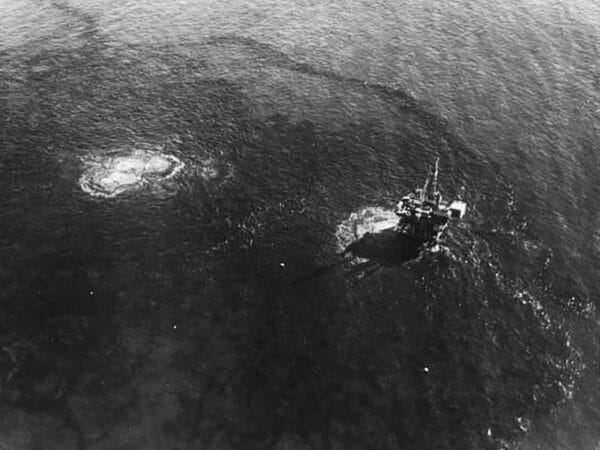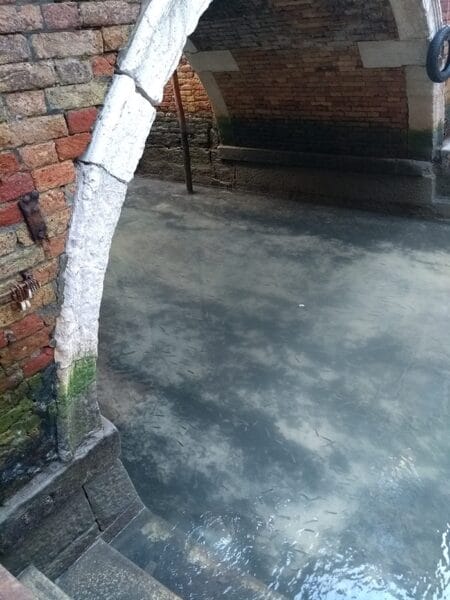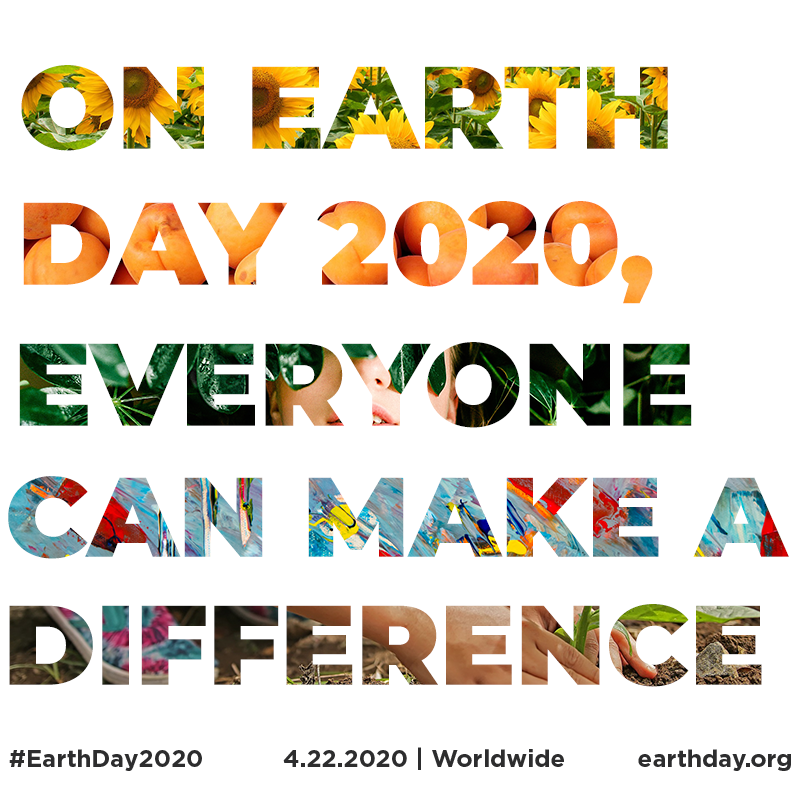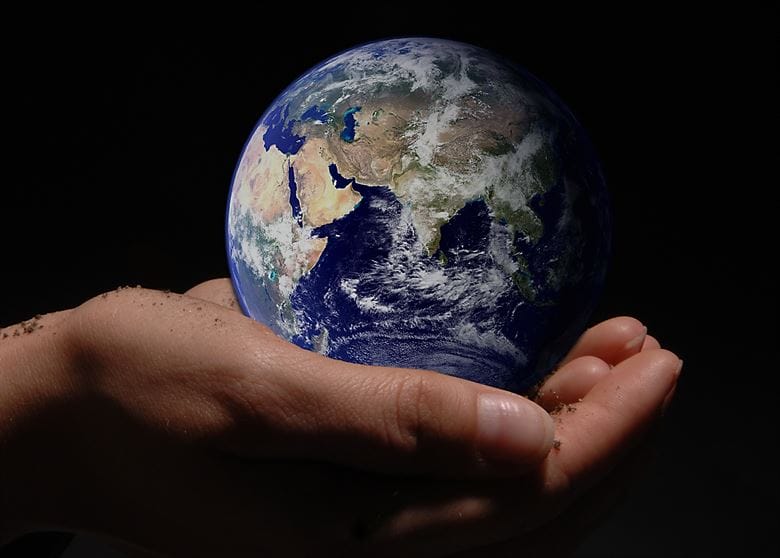The Oil Spill that Inspired Earth Day
On January 28, 1969, crude oil and gas erupted from a platform off the coast of Santa Barbara, spilling out into the Pacific waters. It blackened over 800 square miles of ocean, killing thousands of seabirds, marine mammals, and fish. At the time, it was the largest oil spill in history. Today, it is topped by only two other oil spills and remains the worst California’s waters have seen.

1969 Santa Barbara Oil Spill, Earth Day 2020 | Synergetic Press
The devastating event’s one silver lining was that it served as a catalyst for a widespread and enduring campaign promoting environmental awareness. After the spill, Gaylord Nelson, an environmentally-conscious Wisconsin senator, realized that public awareness around industrial technology’s impact on the planet needed a serious boost. Harnessing the anti-war protest energy of the 60s, he, along with a Republican congressman, a young Harvard graduate, and a team of 85 people, organized a national “teach-in” to take place on April 22, 1970.
It was the first official Earth Day. Twenty million people took to the streets to protest humanity’s destructive behavior towards the environment. In the 50 years since its inception, Earth Day has served as a celebration of our planet and raises public awareness around pollution with events and activist initiatives coordinated worldwide.
Our Collective Carbon Footprint
For Earth Day 2020, activists planned to celebrate the theme of “Climate Action” by organizing The Great Global Cleanup, a day dedicated to removing trash from green space and urban centers. But since the outbreak of COVID-19, and the ensuing government mandates to socially distance and stay indoors, Earth Day convergences are going digital (much like everything else).
The pandemic is a tragedy. However, like the 1969 Santa Barbara oil spill, there is a silver lining to this devastating global crisis. While modern society stumbles over itself after coming to a screeching halt, the earth has a chance to breathe again. With non-essential establishments closing their doors, major airports “eerily silent,” and most people self-confining at home, our collective carbon footprint has significantly decreased.

Clear waters in Venice canals. Photo by Marco Capovilla. Earth Day 2020 | Synergetic Press
The Guardian reports that “global carbon emission could fall by 2.5bn tonnes this year, a reduction of 5%, as the coronavirus pandemic triggers the biggest drop in demand for fossil fuels on record.” Satellites detect a drop in nitrogen-oxide emissions in China, and lower air pollution in Italy. And for the first time in recent history, the normally smog-battered skies of Los Angeles are clear and bright. An interactive map created by Earther provides a staggering visual of how much air pollution has dropped across the globe from December 2019 to March 2020. One YouTuber, PLANET NOW, posted a video showing before-and-after shots of Venice canals – once murky and green, now a limpid blue – suggesting we can maintain these conditions by reducing tourism and working from home more.
The Pandemic Slows Down Industrial Society
Things aren’t just cleaner – they’re quieter too. For those living in industrial society, slowed-down living may revitalize their relationship to the planet. Rebecca Franks, an American living in Wuhan, posted to Facebook about life in quarantine, saying: “Right now I hear birds outside my window. I used to think there weren’t really birds in Wuhan because you rarely saw them and never heard them. I now know they were just muted and crowded out by the traffic and people.”
Michelle Fournet, a marine ecologist studying acoustic environments, tells The Atlantic that since the suspension of the cruise ship industry, “we’re experiencing an unprecedented pause in ocean noise that probably hasn’t been experienced in decades.” According to research, maritime activity (including military sonar, seismic surveys, oil drilling, dredging and ship engines) causes stress and physical damage to sea animals, altering their behavior and communication systems.
Meanwhile, pictures and videos of wild animals traversing empty towns and cities are circulating widely on social media. Mountain goats blithely stroll the streets of Wales. A deer in Japan curiously peeks inside a restaurant window. A family of geese waltz down the center of Las Vegas Boulevard. Could the popularity of these kinds of posts speak to an underlying, collective yearning to witness mother nature “reboot” herself, as two Twitter users put it?
***
The pandemic has stirred the whole world into unified action in the way that other very real threats to humanity have not – namely, climate change. Decades of activist efforts to influence human activity have not been able to match COVID-19’s galvanizing effect. Now that humanity’s impact on the planet is more tangible than ever, it may be the perfect time to emphasize environmental awareness. While the usual celebration is not in order for this year’s Earth Day, we can observe its theme of “Climate Action” by reflecting on how, and why, our planet feels a little brighter, and what we might do to sustain that going forward.
 Celebrating Earth Day 2020 Online
Celebrating Earth Day 2020 Online
Join the Earth Day Network this April 22nd for Earth Day Live (starting at 9:00 AM ET-8:00 PM ET). Earth Day Live will flood the digital landscape with global conversations, calls to action, performances, and video teach-ins with the goal of mobilizing a stop to the climate emergency.
At 2:00 PM ET Dr. Silvia Earle, marine biologist, explorer, and writer of the foreword to Life Under Glass: will be speaking, followed by a virtual Q&A featuring biospherians Mark Nelson, Linda Leigh, and Spaceship Earth director Matt Wolfe.

